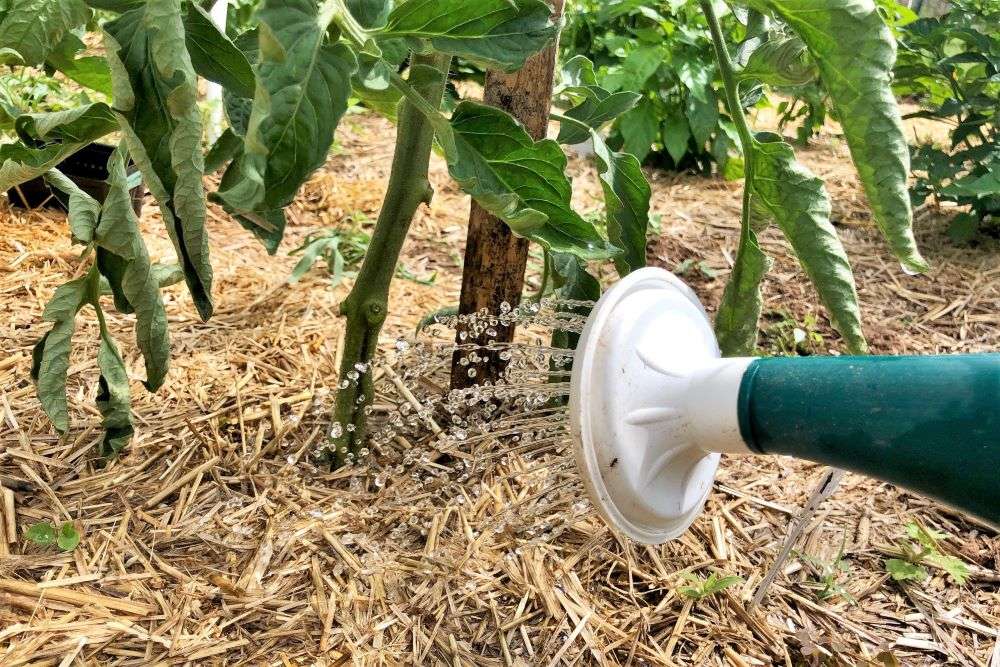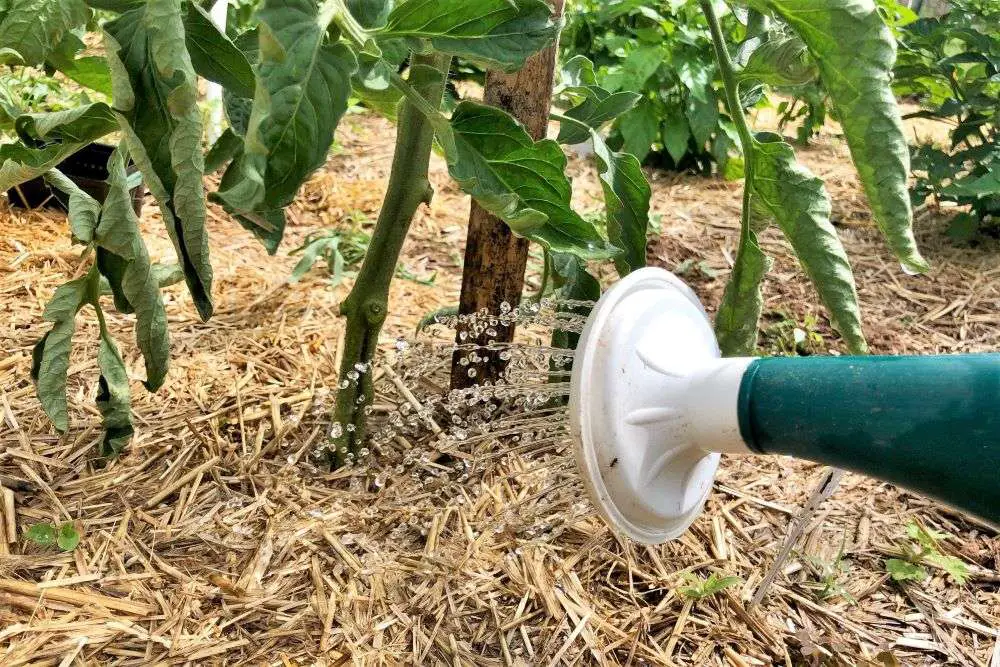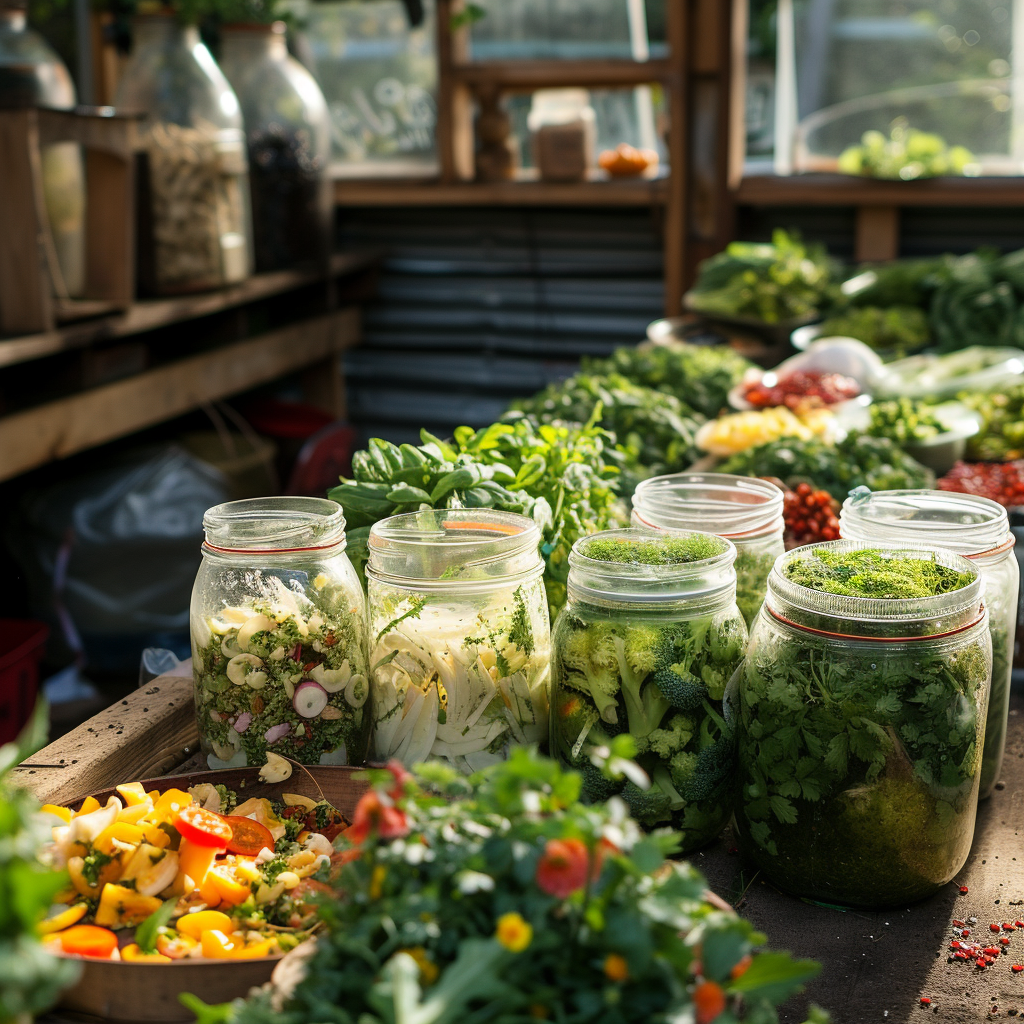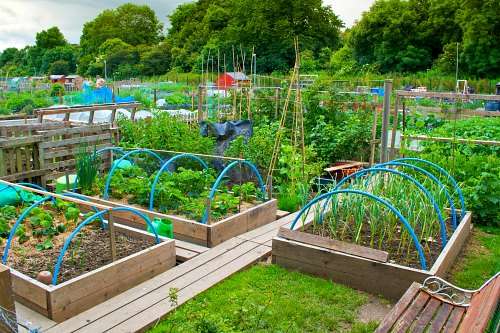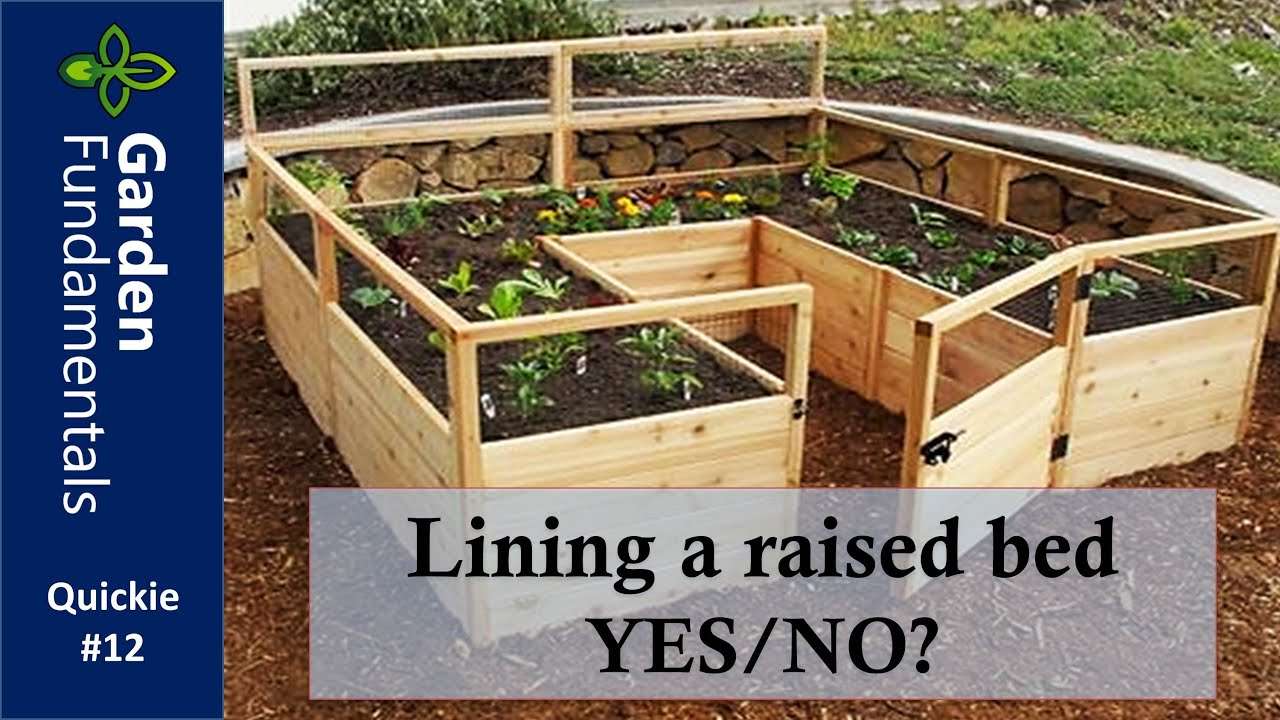If you’re looking to maximize the health and productivity of your tomato plants, using mulch is a no-brainer. Not only does mulching help retain water and prevent soil from drying out, but it also acts as a natural barrier against pesky weeds. Organic mulch is highly recommended for tomato plants, and options such as grass clippings, hay, straw, cardboard, leaves, and compost are all great choices. However, it’s important to steer clear of plastic and rubber mulch, as these materials are not suitable for tomato plants. If you prefer alternative options, you can also consider mulching with materials like cardboard, newspaper, pine needles, or additional compost. So, whether you’re a seasoned gardener or just starting out, incorporating mulch into your tomato planting routine is a simple and effective way to promote healthy growth and boost yields.
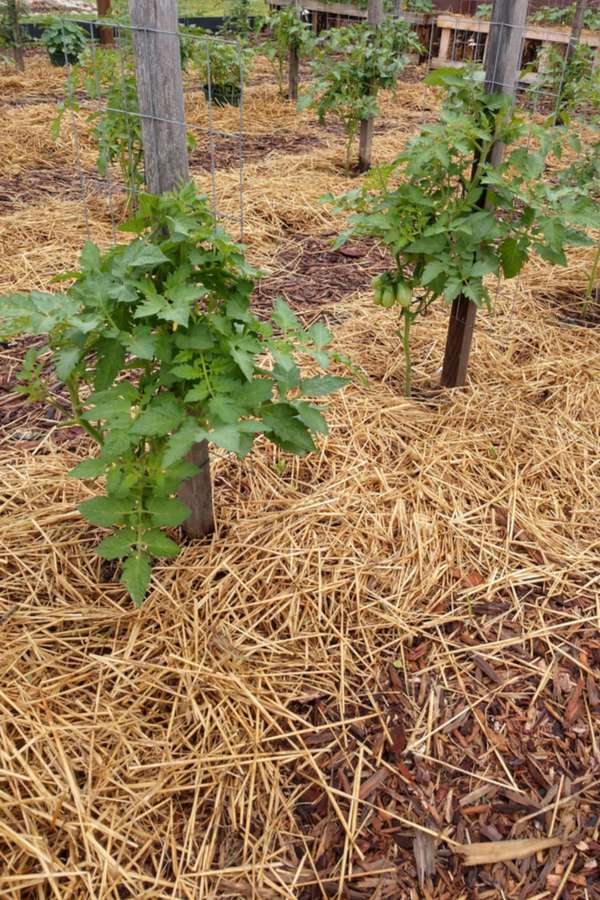
Benefits of using mulch for tomato plants
Mulching is a popular gardening technique that offers numerous benefits for tomato plants. By applying a layer of mulch around your tomato plants, you can improve soil health, conserve water, suppress weeds, and enhance overall plant growth. Let’s explore these benefits in detail.
Retains water and prevents soil from drying out
One of the key advantages of using mulch for tomato plants is its ability to retain water and prevent soil from drying out. When you apply mulch around the base of your plants, it acts as a protective layer, reducing water evaporation and maintaining consistent soil moisture. As a result, your tomato plants are less likely to experience drought stress, ensuring optimal growth and productivity.
Acts as a barrier against weeds
Weeds can compete with tomato plants for essential resources such as nutrients, water, and sunlight. However, mulch serves as an effective barrier against weeds, suppressing their growth and reducing competition. By smothering weed seeds and blocking their access to sunlight, mulch saves you time and effort spent on weeding, allowing your tomato plants to thrive without interference.
Helps regulate soil temperature
Another advantage of using mulch for tomato plants is its ability to regulate soil temperature. Mulch acts as an insulating layer, protecting the roots of your tomato plants from extreme heat during summer and providing insulation against cold temperatures during winter. By maintaining optimal soil temperature, mulch promotes better plant growth, ensuring your tomato plants stay healthy and productive.
Provides nutrients to the soil
Mulch doesn’t just offer physical benefits; it also provides essential nutrients to the soil. As the mulch gradually decomposes over time, it releases nutrients into the soil, enhancing soil fertility. This nutrient-rich environment promotes healthier root development and increases the availability of essential elements for your tomato plants. By using mulch, you can reduce the need for additional fertilizers, saving both time and money.
Prevents soil erosion
Soil erosion can be detrimental to the health of your tomato plants. However, using mulch acts as a protective barrier, preventing erosion caused by wind and water. By covering the soil surface, mulch preserves the topsoil, maintaining its integrity and preventing nutrient loss. This, in turn, ensures that your tomato plants have a stable and fertile growing environment.
Improves soil structure
Mulch plays a crucial role in improving soil structure. It promotes better water drainage, allowing excess water to flow away, thus preventing waterlogging and root rot. Additionally, mulch increases soil aeration, providing oxygen to the roots and improving microbial activity. These factors combined enhance the overall structure of the soil, creating the perfect environment for your tomato plants to thrive.
Reduces the risk of soil-borne diseases
Tomato plants are susceptible to various soil-borne diseases caused by fungi, bacteria, and other pathogens. However, using mulch can help reduce the risk of such diseases. Mulch acts as a physical barrier, preventing disease-causing organisms from splashing onto the leaves and stems of your tomato plants. This helps minimize the spread of fungal and bacterial diseases and protects the overall health of your plants.
Enhances tomato plant growth
With its ability to retain moisture, suppress weeds, regulate soil temperature, and enrich the soil, mulch provides the perfect conditions for optimal tomato plant growth. By creating a favorable environment, mulch ensures that your plants receive the necessary resources for healthy foliage, strong roots, and abundant fruit production. The result is luscious, flavorful tomatoes that are the pride of any garden.
Increases tomato yield
When you implement mulching techniques for your tomato plants, you can expect an increase in tomato yield. By providing a consistent supply of moisture, nutrients, and optimal soil conditions, mulch supports robust plant growth and development. This, in turn, leads to higher fruit production and a bountiful harvest. So, if you’re looking to maximize your tomato yield, mulching is a tried-and-true method to achieve just that.
Saves time and effort
Perhaps one of the most significant benefits of using mulch for tomato plants is the time and effort it saves you in the long run. Mulch acts as a natural barrier to weeds, reducing the need for frequent weeding. It also minimizes water evaporation, decreasing the frequency of watering. Additionally, mulch eliminates the need for excessive tilling and amending the soil, simplifying your gardening tasks. With mulch in place, you can spend less time maintaining your tomato plants and more time enjoying the fruits of your labor.
Recommended organic mulches for tomato plants
Now that we’ve explored the benefits of mulching for tomato plants, let’s discuss some recommended organic mulches that are ideal for this purpose. Organic mulches, derived from natural materials, offer numerous advantages over synthetic options. They not only provide the necessary benefits for your tomato plants but also contribute to overall soil health and sustainability.
Grass clippings
Grass clippings are one of the most readily available organic mulches for tomato plants. They provide excellent moisture retention, weed suppression, and nutrient enrichment. However, be sure to use only untreated grass clippings, as those treated with herbicides or pesticides can harm your tomato plants. Apply a layer of grass clippings around the base of your tomato plants, making sure to avoid direct contact with the stems.
Hay
Hay is another organic mulch option that works well for tomato plants. It helps conserve moisture, inhibit weed growth, and gradually adds nutrients to the soil as it decomposes. Like grass clippings, it’s essential to use untreated hay to avoid any harmful chemicals. Apply a layer of hay around your tomato plants, ensuring proper coverage without smothering the stems.
Straw
Straw is a popular choice for mulching tomato plants. It offers excellent water retention, weed suppression, and insulation. Straw decomposes relatively slowly, providing long-lasting benefits to your tomato plants. Apply a thick layer of straw around the base of your plants, ensuring the stems are not covered to prevent moisture-related diseases.
Cardboard
Cardboard makes for an effective mulching material, particularly for weed suppression. It prevents sunlight from reaching weed seeds, inhibiting their growth. Cardboard also decomposes over time, adding organic matter to the soil. Flatten out pieces of cardboard and place them around your tomato plants, overlapping them to create a barrier against weeds.
Leaves
Leaves are another readily available and beneficial organic mulch for tomato plants. They help conserve moisture, suppress weeds, and provide a slow release of nutrients as they break down. Collect fallen leaves, shred them, and apply a layer around your tomato plants. Avoid using leaves from trees that are known to harbor pests or diseases.
Compost
Compost is a valuable mulching material that brings a range of benefits to your tomato plants. It improves soil structure, enriches the soil with nutrients, and enhances microbial activity. Apply a layer of compost around your tomato plants, ensuring it’s well decomposed to avoid any potential burning of plant stems.
Benefits of retaining water and preventing soil from drying out
Retaining water and preventing soil from drying out is a critical advantage of mulching for tomato plants. By conserving moisture, mulch helps maintain optimal soil moisture levels, reducing the need for frequent watering. Let’s explore the benefits of this aspect in more detail.
Reduces water evaporation
When exposed to direct sunlight and wind, bare soil can quickly lose moisture through evaporation. However, by applying mulch, you create a protective barrier that reduces water evaporation. This means that water applied to your tomato plants is retained in the soil for a longer period, ensuring continuous hydration for their roots.
Helps maintain consistent soil moisture
Consistent moisture levels are essential for proper tomato plant growth. Fluctuations in soil moisture can cause stress to the plants and affect their overall health. Mulch acts as a buffer, regulating soil moisture by preventing rapid drying out. This keeps the soil consistently moist, providing an ideal environment for your tomato plants to thrive.
Reduces the frequency of watering
Watering your tomato plants can be time-consuming and labor-intensive. However, with mulch in place, you can reduce the frequency of watering significantly. The mulch layer helps retain moisture in the soil, extending the time between watering sessions. This not only saves you time and effort but also conserves water, making your gardening practices more sustainable.
Prevents tomato plant stress due to drought
Drought stress can have detrimental effects on tomato plants, leading to stunted growth, wilting, and reduced fruit production. By retaining water and preventing soil from drying out, mulch helps protect your tomato plants from drought stress. The consistent moisture levels provided by mulch ensure that your plants have access to the water they need, minimizing the risk of stress-induced damage.
Benefits of acting as a barrier against weeds
Weeds are a common nuisance in any garden, competing with tomato plants for essential resources and creating an unsightly landscape. Fortunately, using mulch as a barrier against weeds offers several advantages that can save you time and effort while promoting the health of your tomato plants.
Suppresses weed growth
Mulch serves as an effective barrier, suppressing the growth of weeds around your tomato plants. By blocking sunlight and preventing weed seeds from reaching the soil surface, mulch inhibits weed germination and growth. This reduces the need for manual weeding and minimizes the competition for resources between weeds and your tomato plants.
Reduces competition for nutrients, water, and sunlight
Weeds can be voracious competitors, robbing your tomato plants of essential nutrients, water, and sunlight. However, by creating a barrier against weeds, mulch helps eliminate this competition. The mulch layer prevents weed roots from accessing the soil below, giving your tomato plants the advantage when it comes to utilizing available resources.
Saves time and effort spent on weeding
Weeding can be a time-consuming and physically demanding task. However, by using mulch as a weed barrier, you can reduce the time and effort required for weeding. Mulch suppresses weed growth, minimizing the number of weeds that emerge in your tomato plant beds. This means less time spent kneeling, pulling out weeds, and more time enjoying your garden.
Prevents weed-induced diseases in tomato plants
Certain weeds can harbor pests and diseases that can affect the health of your tomato plants. By creating a physical barrier against weeds, mulch helps prevent the spread of these weed-induced diseases. This contributes to the overall well-being of your tomato plants and reduces the need for pesticides or other interventions to control weed-related pathogens.
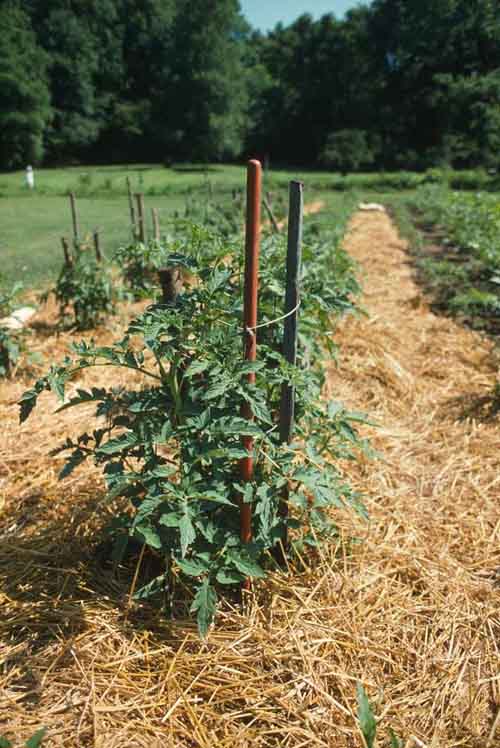
Benefits of regulating soil temperature
Soil temperature plays a crucial role in the growth and development of tomato plants. Extreme temperatures can stress the plants and negatively impact their productivity. But with the help of mulch, you can regulate soil temperature and create a more favorable environment for your tomato plants.
Helps maintain optimal soil temperature for tomato plants
Tomato plants thrive within a specific range of soil temperatures. Excessive heat or cold can impede their growth and affect fruit production. However, mulch acts as an insulating layer, helping to maintain optimal soil temperature for your tomato plants. By keeping the soil cooler in hot weather and warmer in colder conditions, mulch supports the overall health and productivity of your plants.
Protects roots from extreme heat and cold
The roots of tomato plants are particularly susceptible to damage caused by extreme temperatures. Excessive heat can cause root stress and limit nutrient uptake, while cold temperatures can stunt root growth and reduce water absorption. Mulch provides a protective layer that shields the roots from these temperature extremes, ensuring their health and promoting vigorous plant growth.
Promotes better tomato plant growth and productivity
By regulating soil temperature, mulch creates optimal conditions for tomato plant growth and productivity. When the roots are protected from extreme heat or cold, the plant can focus its energy on foliage development, flower formation, and fruit production. The result is healthier, more robust tomato plants that yield a higher quantity and quality of tomatoes.
Benefits of providing nutrients to the soil
Healthy soil is the foundation for successful plant growth, and mulch plays a significant role in improving soil fertility. By providing essential nutrients to the soil, mulch ensures that your tomato plants have access to the resources they need for optimal development.
Mulch gradually decomposes and releases nutrients into the soil
Organic mulches, such as grass clippings, hay, straw, cardboard, leaves, and compost, gradually decompose over time. As they break down, they release valuable nutrients into the soil, enriching its fertility. This slow-release nutrient supply ensures a constant source of essential elements for your tomato plants, supporting healthy growth and development.
Enhances soil fertility and nutrient availability for tomato plants
The continuous decomposition of mulch not only adds nutrients to the soil but also enhances its overall fertility. As the organic matter breaks down, it improves soil structure, increases water retention, and promotes beneficial microbial activity. This creates an ideal habitat for beneficial organisms that further contribute to nutrient availability and plant health.
Reduces the need for additional fertilizers
By naturally enriching the soil, mulch reduces the need for additional fertilizers in your tomato garden. The steady supply of nutrients from decomposing mulch decreases reliance on synthetic fertilizers, making your gardening practices more environmentally friendly. This also saves you money and simplifies your tomato plant care routine, all while ensuring the health and productivity of your plants.

Benefits of preventing soil erosion
Soil erosion is a common problem that can be detrimental to the health of your tomato plants and the productivity of your garden. However, mulch plays a crucial role in preventing soil erosion and preserving the integrity of your planting area.
Protects the topsoil from erosion caused by wind and water
Wind and water can erode the topsoil, washing away valuable nutrients and leaving your plants vulnerable. However, by applying mulch, you create a protective layer that shields the soil from these erosive forces. Mulch absorbs the impact of raindrops, preventing them from dislodging soil particles. It also acts as a buffer against wind, reducing soil erosion caused by gusts.
Preserves the integrity of the planting area
Soil erosion can lead to the loss of valuable topsoil, which is essential for optimal plant growth. Mulch helps preserve the integrity of your planting area by preventing soil erosion. By keeping the soil in place, mulch ensures that the nutrients and structure necessary for your tomato plants’ well-being are retained, promoting healthy growth and maximizing productivity.
Maintains good soil structure and fertility
Soil erosion can disrupt the structure and fertility of your garden soil. However, by preventing erosion through the use of mulch, you can maintain a stable and fertile soil environment. The retained topsoil contributes to the overall structure of the soil, providing aeration, water drainage, and nutrient availability. This creates an ideal growing medium for your tomato plants, supporting their root development and overall vitality.
Benefits of improving soil structure
Proper soil structure is essential for healthy plant growth, and mulch can significantly improve the structure of your garden soil. By using mulch around your tomato plants, you can enhance water drainage, increase soil aeration, and promote robust root development.
Promotes better water drainage
Excess water in the soil can lead to root rot and other moisture-related problems. However, by improving soil structure, mulch helps enhance water drainage. It prevents water from pooling around the roots of your tomato plants, allowing excess moisture to flow away more efficiently. Proper water drainage ensures that your plants receive the right amount of water without becoming waterlogged.
Increases soil aeration
Air circulation in the soil is crucial for healthy root development and the overall well-being of your tomato plants. Mulch promotes soil aeration by creating spaces within the soil for the movement of air. This is particularly important for the roots, as they require oxygen to function properly. Increased soil aeration facilitated by mulch leads to stronger, more robust root systems and better nutrient uptake.
Enhances root development in tomato plants
A healthy root system is vital for the growth and productivity of tomato plants. Mulch contributes to the development of strong, well-branched roots by providing a favorable soil environment. Improved soil structure created by mulch allows roots to penetrate easily, explore a larger volume of soil, and access essential nutrients and water. This, in turn, supports overall plant growth, leading to higher yields of delicious tomatoes.
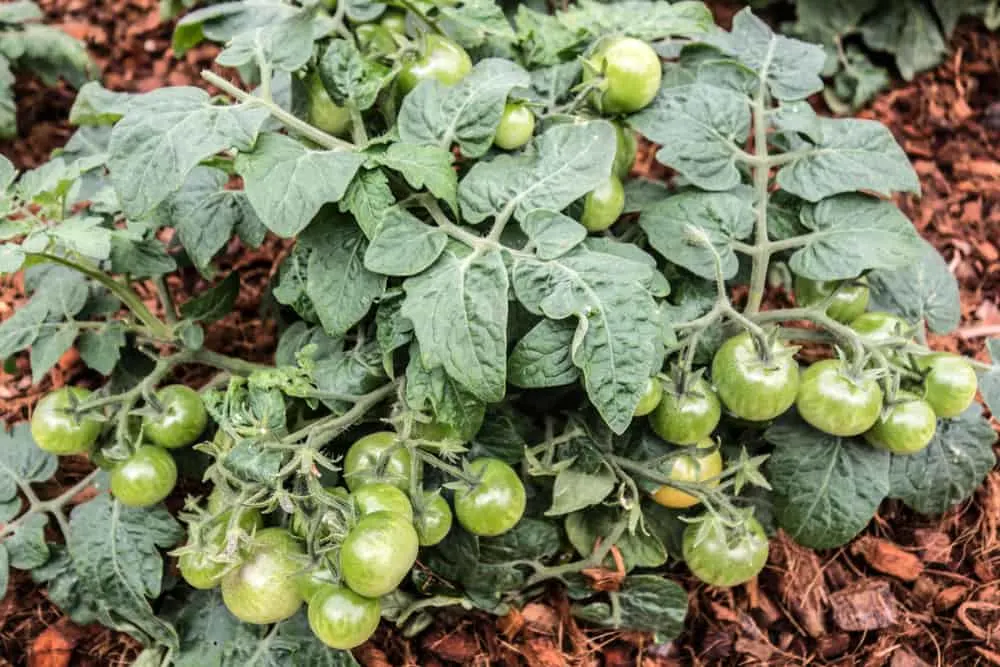
Benefits of reducing the risk of soil-borne diseases
Soil-borne diseases can pose a significant threat to the health and productivity of your tomato plants. However, by using mulch as a protective barrier, you can reduce the risk of these diseases and ensure the longevity of your plants.
Acts as a physical barrier against disease-causing organisms
Mulch serves as a physical barrier that prevents disease-causing organisms from coming into direct contact with your tomato plants. By covering the soil surface, mulch inhibits the splashing of soil particles onto plant leaves and stems. This significantly reduces the likelihood of pathogens gaining entry to your plants through wounds or natural openings, minimizing the risk of disease development.
Reduces the spread of fungal and bacterial diseases
Fungal and bacterial diseases can easily spread through soil contact. However, by using mulch, you create a protective layer that hinders the spread of these diseases. Mulch prevents soil splashing, which can transport disease-causing spores to your tomato plants. This is particularly crucial for diseases like early blight or Fusarium wilt that thrive in the soil and can severely damage tomato plants.
Protects tomato plants from soil-borne pathogens
Mulch acts as a shield, protecting your tomato plants from soil-borne pathogens that may be present in your garden. It acts as a physical barrier, preventing direct contact between the soil and your plants’ foliage. By minimizing the risk of infection, mulch contributes to the overall health and longevity of your tomato plants, ensuring they have a better chance of resisting soil-borne diseases.
Using compost as mulch for tomato plants
Compost is a rich source of organic matter and nutrients, making it an excellent choice for mulching tomato plants. Let’s explore the benefits of using compost as mulch, how to apply it, and some important considerations.
Benefits of using compost as mulch
Using compost as mulch offers a range of benefits for your tomato plants. Compost adds organic matter to the soil, improving its structure and water-holding capacity. It also provides a steady release of nutrients, enriching the soil and supporting healthy plant growth. Additionally, compost enhances microbial activity in the soil, further promoting nutrient availability and overall soil health.
How to apply compost as mulch
To apply compost as mulch for your tomato plants, follow these steps:
- Prepare the soil: Before mulching, ensure that the soil around your tomato plants is well-prepared. Remove any existing weeds or debris and gently loosen the topsoil to promote good contact between the compost and the soil.
- Apply a layer of compost: Spread a layer of compost around the base of your tomato plants, ensuring uniform coverage. Aim for a thickness of about 2 to 3 inches, taking care not to bury the stem of the plants.
- Avoid direct contact with stems: When applying compost as mulch, be mindful of not placing it in direct contact with the stems of your tomato plants. This prevents excess moisture and potential rotting, which can harm the plants.
- Maintain the mulch layer: As the compost mulch gradually decomposes, it may become thinner over time. Check the mulch layer periodically and replenish it as needed to maintain an optimal thickness.
Considerations when using compost as mulch
When using compost as mulch for your tomato plants, keep the following considerations in mind:
- Quality of compost: Ensure that the compost you use is well-aged and fully decomposed. Immature or fresh compost may contain pathogens or excessive levels of nitrogen, which can harm your tomato plants.
- Nutrient content: Assess the nutrient content of your compost and consider the nutrient requirements of your tomato plants. Depending on the composition of the compost, you may need to adjust your fertilizer application accordingly.
- Mulch depth: The thickness of the compost mulch layer is important. Avoid applying a thick layer that could create excess moisture or restrict air circulation. Aim for a 2 to 3-inch depth, ensuring a balance between moisture retention and proper airflow.
- Weed control: Compost mulch can provide some weed suppression benefits. However, it may not be as effective at suppressing persistent or more aggressive weeds. Consider supplementing the compost mulch with other weed control methods if necessary.
Using compost as mulch is an excellent way to improve soil fertility, retain moisture, and support the overall health of your tomato plants. Experiment with composting techniques and incorporate this nutrient-rich material into your mulching routine for optimal results.
In conclusion, the benefits of using mulch for tomato plants are numerous. From water retention and weed suppression to regulating soil temperature and providing nutrients, mulch enhances the overall health and productivity of your tomato plants. By choosing organic mulch options such as grass clippings, hay, straw, cardboard, leaves, and compost, you ensure a sustainable and environmentally friendly gardening practice. So, go ahead and invest in mulching your tomato plants to enjoy the bountiful harvest and beautiful, healthy plants that await you. Save time and effort, while reaping the rewards of a successful tomato garden.
